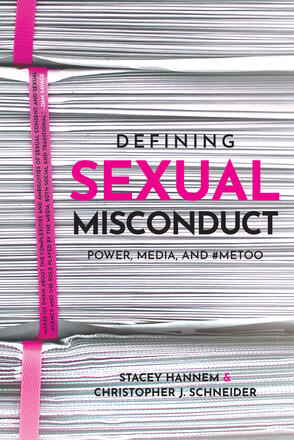
Defining Sexual Misconduct
Power, Media, and #MeToo
La description
This book examines the contemporary dynamics of public accusations and their relationship to more formal criminal justice processes, as well as the implications of this shifting landscape for the stigmatization of alleged abusers and public response to alleged victims. Sexual misconduct relies on power imbalances and media play a fundamental role in social power.
Récompenses
- Commended, Charles Horton Cooley Book Award 2023
- Short-listed, The Hill Times Best Books of the Year 2022
- Winner, Midwest Sociological Society’s Distinguished Book Award 2024
Reviews
“An incredibly nuanced, essential, and important multidisciplinary analysis of the social, cultural, political, and personal aspects of sexual misconduct . . . I have no doubt that this will be the authoritative text on sexual misconduct for many years to come.” —Susan Fowler, author of Whistleblower
“Defining Sexual Misconduct is essential to understanding the origins of a movement and the many barriers that survivors of sexual violence face when their stories are used as political and media fodder. This book is required reading for anyone who wants to understand how far we have come in recognizing the prevalence of sexual misconduct, and how much work is still left to do in the fight for justice.” —Alyssa Milano, actress, author, producer, and activist
"This book really helps to illuminate and clarify the potential harms that can be done in the absence of sexual consent. By walking us through well-known examples from news reports, the authors make us think about the challenges survivors face when disclosing, how hard it is to hold abusers accountable, and the complexities and ambiguities of sexual consent and sexual agency — and the role played by the media, both social and traditional." —Dan Savage, author of It Gets Better and American Savage
“A serious advance . . . in research. This is the first book I have seen tracing media development of the term, ‘sexual misconduct’ . . . It's timely and important." —Tracy Everbach, co-author of Mediating Misogyny: Gender, Technology and Harassment
“The analysis of the complexity of agency and responsibilization is brilliant." —Ummni Khan, author of Vicarious Kinks: Sadomasochism in the Socio-Legal Imaginary"This is a remarkable and fascinating work...By opening up the social media practice of ’sexual misconduct’ discourse, Hannem and Schneider make visible in detail just how the major transformations in women’s traditional forms of sexual subjugation are being transformed. We can learn in and from this book how ‘sexual misconduct’ as a discursive initiative of social media has piece by piece concluded in establishing women’s right to be heard when we speak out of our experience of sexual subjugation. In sum, this book is an exceptionally fine historical study, a model for future explorations of the power of social media." —Dorothy E. Smith, University of Victoria
"Hannem and Schneider point to thorny questions about gendered power, the media, and consent. Among their concerns are the ways that extra-legal accusations continue to stigmatize those who speak out, while legal systems too often fail to deliver justice to victims." —Literary Review of Canada
"Defining Sexual Misconduct: Power, Media, and #MeToo has the potential to be a leading text for those wanting to learn more about the social construct of defining sexual misconduct.” —Canadian Law Library Review